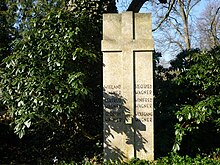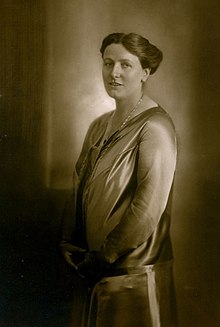Winifred Wagner
Winifred Wagner , born as Winifred Marjorie Williams (born June 23, 1897 in Hastings , England ; † March 5, 1980 in Überlingen ) was a British-German festival director and Richard Wagner's daughter-in-law (born after his death). After the death of her husband Siegfried Wagner in 1930, she was the director of the Bayreuth Festival until 1944 . She was a friend and supporter of Adolf Hitler and confessed to him after the Nazi era .
Life
Winifred Wagner was the only daughter of the English journalist John Williams and his wife Emily Florence Karop. After the early death of her parents, she was adopted as an orphan by the Klindworth couple in Berlin in 1907 . Her adoptive father Karl Klindworth , with whom she lived in the reform estate of Eden , brought her into contact with the Wagner family. Klindworth himself was an avid supporter of Richard Wagner and wrote piano reductions for many of his works.
At the age of 18 she married Siegfried Wagner, born in 1869, on September 22, 1915. The marriage had four children:
- Wieland (1917–1966)
- Friedelind (1918–1991)
- Wolfgang (1919-2010)
- Verena (1920-2019)
Early engagement in the NSDAP
Winifred Wagner was a close personal friend of Adolf Hitler, whom she had met shortly after the German Day in Bayreuth in 1923 and who she introduced to the Wagner family. After the failed Hitler-Ludendorff putsch - which, according to her own account, she witnessed as an eyewitness - and Hitler's imprisonment in Landsberg , she corresponded with Hitler and sent him parcels. From her, Hitler obtained everything “what a supposed genius might need”, including “large amounts of typewriter paper” and accessories, which enabled him to start writing his propaganda pamphlet Mein Kampf . Since 1925 she has been on a duel with Hitler; her children called him "Uncle Wolf". In January 1926 she joined the NSDAP ( member number at 29,349) and adopted in July at the Nazi Party in Weimar in part. Goebbels judged Winifred Wagner in his diary on May 8, 1926: “ A racy woman. That's how they should all be. And fanatical on our side. "
On December 19, 1928, she was one of the signatories of the founding manifesto of the Kampfbund für deutsche Kultur .
Director of the Bayreuth Festival
After Siegfried Wagner's death on August 4, 1930, Winifred took over the management of the Bayreuth Festival as his widow, which made it a central Nazi cult site during the following years. The artistic director of the Berlin State Opera, Heinz Tietjen , acted .
From 1933 Hitler was a permanent guest at the festival. From 1936 until his last visit to Bayreuth in 1940, he lived in the Siegfried Wagner House during the festival, an extension of the Wahnfried House used as a guest house . Up until the closure of all German theaters and the last festival in 1944, Hitler's instructions were used to organize war festivals for propaganda purposes; the audience consisted mainly of wounded soldiers, for whose arrival the organization Kraft durch Freude ensured.
On October 16, 1944, when the defeat was already foreseeable, Winifred Wagner made a public pledge of loyalty to Hitler in which she wrote: “ ... he has grown into heroism, is our Führer through night to light. "
post war period
In the denazification process on July 2, 1947, she was found by the lay court of the Bayreuth-Stadt Spruchkammer as a National Socialist of Group II ("incriminated"). The result was atonement and a restriction of their basic rights, large parts of Wagner's property were confiscated. At the instigation of the Bayreuth lawyer Fritz Meyer, an appeal hearing took place on December 8, 1948 before the Appeals Chamber in Ansbach . This time she was classified as “less burdened” in group III and had to. a. Pay only 6,000 DM into the reparation fund. With this judgment she was still the sole heir to the Wagner family property, which also included the festival hall . On January 21, 1949, she announced by contract that she would renounce the management of the festival. She handed over the management of the festival to her sons Wieland and Wolfgang and largely withdrew from public life. As the previous heir of her husband , she remained the owner of the Festspielhaus until the Richard Wagner Foundation in Bayreuth was established in 1973. On September 1, 1950, she was only classified in the group of fellow travelers (implementation of the law on the conclusion of the political liberation of July 27, 1950).
Even later, Winifred Wagner's circle of friends included old Nazis such as Gerdy Troost , Karl Kaufmann , Will Vesper , Hans Severus Ziegler , Ilse Hess and the English fascist Oswald Mosley .

In 1975 she gave a film interview to the filmmaker Hans-Jürgen Syberberg , which was released as a five-hour documentary film under the title Winifred Wagner and the history of the house of Wahnfried 1914–1975 . In it she showed herself to be an unbroken friend of Hitler and openly confessed to him: “Well, if Hitler came through the door today, for example, I would be just as so so happy and so happy to see and have him here as how always …"
She rejected any critical view of the dictator and left that to the historians. Rather, she saw in Adolf Hitler the friend of the Wagner family and above all the admirer of the “master” (Richard Wagner). After these and other statements became known, her son, the festival director Wolfgang Wagner, again forbade her to visit the festival and the festival hall.
Winifred Wagner died on March 5, 1980 in Überlingen hospital. She was buried next to her husband in the family grave in the municipal cemetery in Bayreuth .
Fonts
- Through a friend. On the occasion of Arno Breker's 77th birthday on July 19, 1977. Edited by Joe F. Bodenstein. Edition Marco, Paris 1977, ISBN 3-921754-06-3 .
literature
- Peter P. Pachl : Siegfried Wagner. Genius in the shade. Langen Müller, Munich 1994, ISBN 3-7844-2497-X .
- Brigitte Hamann : Winifred Wagner or Hitler's Bayreuth . Piper, Munich 2002, ISBN 3-492-23976-5 .
- Gottfried Wagner : Who doesn't howl with the wolf . Kiepenheuer & Witsch, Cologne 1997, ISBN 3-462-02622-4 .
- Anna Maria Sigmund : The women of the Nazis. Part II, Heyne, 2002, ISBN 3-453-21172-3 .
- Oliver Hilmes : Cosima's children. Triumph and tragedy of the Wagner dynasty. Siedler Verlag, Munich 2009, ISBN 978-3-88680-899-1 .
- Joe F. Bodenstein: Arno Breker - une biography. Èditions SÉGUIER Paris, French first edition 2016, ISBN 978-2-84049-690-8 .
Film / video documentation
- Hans Jürgen Syberberg: Winifred Wagner and the history of the house Wahnfried 1914-1975 . 2 VHS video cassettes, a total of 300 minutes playing time, black and white. Berlin: Alexander Verlag, ISBN 3-923854-85-4 . Also released on DVD, by: Syberberg Filmproduktion, Munich, 2006.
Web links
- International Siegfried Wagner Society V., Bayreuth
- Literature by and about Winifred Wagner in the catalog of the German National Library
- Works by and about Winifred Wagner in the German Digital Library
- Winifred Wagner. In: FemBio. Women's biography research (with references and citations).
- Newspaper article about Winifred Wagner in the 20th century press kit of the ZBW - Leibniz Information Center for Economics .
Individual evidence
- ^ Winifred Wagner or Hitler's Bayreuth. Deutschlandfunk 07/31/2002
- ↑ a b c d e f g Ernst Klee : The culture lexicon for the Third Reich. Who was what before and after 1945. S. Fischer, Frankfurt am Main 2007, ISBN 978-3-10-039326-5 , p. 638.
- ↑ Bernd Mayer : Bayreuth. The last 50 years . 2nd Edition. Ellwanger / Gondrom, Bayreuth 1988, p. 28 .
- ↑ Bernd Mayer, op. Cit. , P. 30.
- ^ Quotation from Ernst Klee: Das Kulturlexikon zum Third Reich. Who was what before and after 1945. S. Fischer, Frankfurt am Main 2007, p. 638.
- ^ Quotation from Ernst Klee: Das Kulturlexikon zum Third Reich. Who was what before and after 1945. S. Fischer, Frankfurt am Main 2007, p. 638.
- ↑ The course set for the festival city In: Nordbayerischer Kurier of July 5, 2018, p. 16.
- ↑ quoted from http://www.syberberg.de/Syberberg3/Alltag_2001/Mai/ZDF/zdf.html
- ↑ Winifred Wagner: "Our blessed Adolf" , article from July 28, 1975 on Spiegel Online
| personal data | |
|---|---|
| SURNAME | Wagner, Winifred |
| ALTERNATIVE NAMES | Williams, Winifred Marjorie |
| BRIEF DESCRIPTION | Anglo-German festival director and Richard Wagner's daughter-in-law (born after his death) |
| DATE OF BIRTH | June 23, 1897 |
| PLACE OF BIRTH | Hastings , England |
| DATE OF DEATH | March 5, 1980 |
| Place of death | Überlingen |

